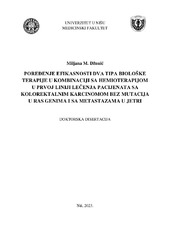Приказ основних података о дисертацији
Poređenje efikasnosti dva tipa biološke terapije u kombinaciji sa hemioterapijom u prvoj liniji lečenja pacijenata sa kolorektalnim karcinomom bez mutacija u RAS genima i sa metastazama u jetri
| dc.contributor.advisor | Vrbić, Svetislav | |
| dc.contributor.other | Petković, Ivan | |
| dc.contributor.other | Stojanović, Miroslav | |
| dc.contributor.other | Cvetanović, Ana | |
| dc.contributor.other | Nikolić, Ivan | |
| dc.creator | Džunić, Miljana | |
| dc.date.accessioned | 2024-03-22T15:33:55Z | |
| dc.date.available | 2024-03-22T15:33:55Z | |
| dc.date.issued | 2023 | |
| dc.identifier.uri | http://eteze.ni.ac.rs/application/showtheses?thesesId=8659 | |
| dc.identifier.uri | https://fedorani.ni.ac.rs/fedora/get/o:2286/bdef:Content/download | |
| dc.identifier.uri | https://plus.cobiss.net/cobiss/sr/sr/bib/133665033 | |
| dc.identifier.uri | https://nardus.mpn.gov.rs/handle/123456789/22353 | |
| dc.description.abstract | In patients with liver metastases of colorectal cancer without RAS genes mutations, antibodies directed towards vascular endothelial growth factor (VEGF) as well as antibodies that block epidermal growth factor receptor (EGFR) may be used in the first line treatment. The aim of the study is to define which type of biological therapy in combination with chemotherapy is more effective in patients with liver metastases of colorectal cancer without RAS genes mutations. This prospective study included 101 patients treated in Clinic of oncology, University Clinical Centre of Niš, of which 50 patients received anti-VEGF therapy bevacizumab, and 51 patients were treated with anti-EGFR therapy (cetuximab or panitumumab) and chemotherapy. Patients that received anti-EGFR therapy had significantly better response rate (70,6 vs. 50%; p=0,034), depth of response (p=0,004) and metastases resection rate (66,67% vs. 46%; p=0,036) than treated with bevacizumab. Progression free survival was significantly longer in the anti-EGFR treatment group (12,1 vs. 8,5 months; HR=0,599; 95%CI[0,392-0,915]; p=0,016). Significantly lower risk for progression had women (HR=0,41; 95%CI[0,19-0,89]; p=0,025), patients older than 50 years (HR=0,54; 95%CI[0,34-0,85]; p=0,009), patients with left-sided primaries (HR=0,61; 95%CI[0,38-0,99]; p=0,047), with the number of metastases ≥5 (HR=0,35; 95%CI[0,13-0,91]; p=0,032) and diameter of metastases >5cm (HR=0,51; 95%CI[0,30-0,87]; p=0,014) when treated with anti-EGFR agents than with bevacizumab. There were no significant difference in overall survival in patients treated with anti-EGFR and anti-VEGF agents (30,4 vs. 25,5 months; HR=0,81; 95%CI[0,50-1,30], p=0,384). Patients with excellent performance status (ECOG 0) had significantly longer survival and lower risk for death if treated with anti-EGFR therapy (38,5 vs. 23,1 months; HR=0,35; 95%CI[0,15-0,82]; p=0,016). Distribution of serious adverse effects (grade ≥3) was not significantly different between treatment groups (37,2% vs. 30%; p=0,44). In patients with liver metastases of colorectal cancer without RAS genes mutations, biological treatment of first line should be directed towards EGFR blockade. | en |
| dc.format | application/pdf | |
| dc.language | sr | |
| dc.publisher | Универзитет у Нишу, Медицински факултет | sr |
| dc.rights | openAccess | en |
| dc.rights.uri | https://creativecommons.org/licenses/by-nc-nd/4.0/ | |
| dc.source | Универзитет у Нишу | sr |
| dc.subject | Kolorektalni karcinom, metastaze u jetri, biološka terapija, preživljavanje, efikasnost | sr |
| dc.subject | Colorectal cancer, liver metastases, biological therapy, survival, efficacy | en |
| dc.title | Poređenje efikasnosti dva tipa biološke terapije u kombinaciji sa hemioterapijom u prvoj liniji lečenja pacijenata sa kolorektalnim karcinomom bez mutacija u RAS genima i sa metastazama u jetri | sr |
| dc.type | doctoralThesis | |
| dc.rights.license | BY-NC-ND | |
| dc.identifier.fulltext | http://nardus.mpn.gov.rs/bitstream/id/160391/Doctoral_thesis_15245.pdf | |
| dc.identifier.rcub | https://hdl.handle.net/21.15107/rcub_nardus_22353 |


